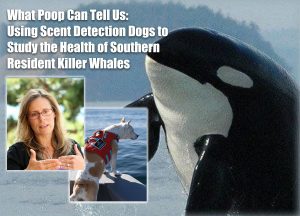1207 Ellsworth St.

Dr. Giles first met the Southern Resident killer whales as a teenager on a trip to the San Juan Islands from California. Upon completing her undergraduate degree, she became a research assistant and began her graduate study specializing in conservation biology and whale behavior, focused primarily on the Southern Resident killer whales. She serves as the Research Director for Wild Orca, monitoring the Southern Resident killer whales’ health. Wild Orca’s high-impact conservation research program utilizes non-invasive sampling with Eba, her highly-trained scent detection dog.
“We’re stronger together, so we collaborate with the most respected names in wildlife conservation research to paint a near real-time picture of the health of endangered Southern Resident killer whales, and provide timely data to the public and management agencies used to understand and address the causes of population decline.”
Using the superpower of a dog’s nose allows our team to remain further away from the whales than other methods, making this research non-invasive. Wild Orca’s high-impact conservation research program utilizes one-of a-kind noninvasive methods. We’re stronger together, so we collaborate with the most respected names in wildlife conservation research to paint a near real-time picture of the health of endangered Southern Resident killer whales, and provide timely data to the public and management agencies used to understand and address the causes of population decline.
Deborah Giles serves as the Research Director for Wild Orca, monitoring the Southern Resident killer whales’ health through non-invasive sampling with Eba, her highly-trained scent detection dog. Giles collaborates with government scientists and other researchers to enhance understanding of the many impacts on these endangered whales from overfishing, pollution and noise. She represents their interests with policymakers, and is frequently interviewed by print and broadcast media as one of the principal voices calling for the recovery of these endangered orcas.







































